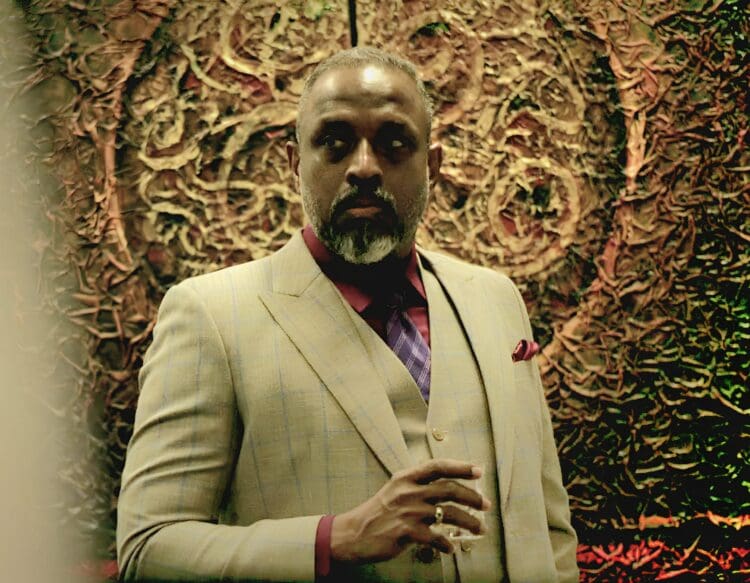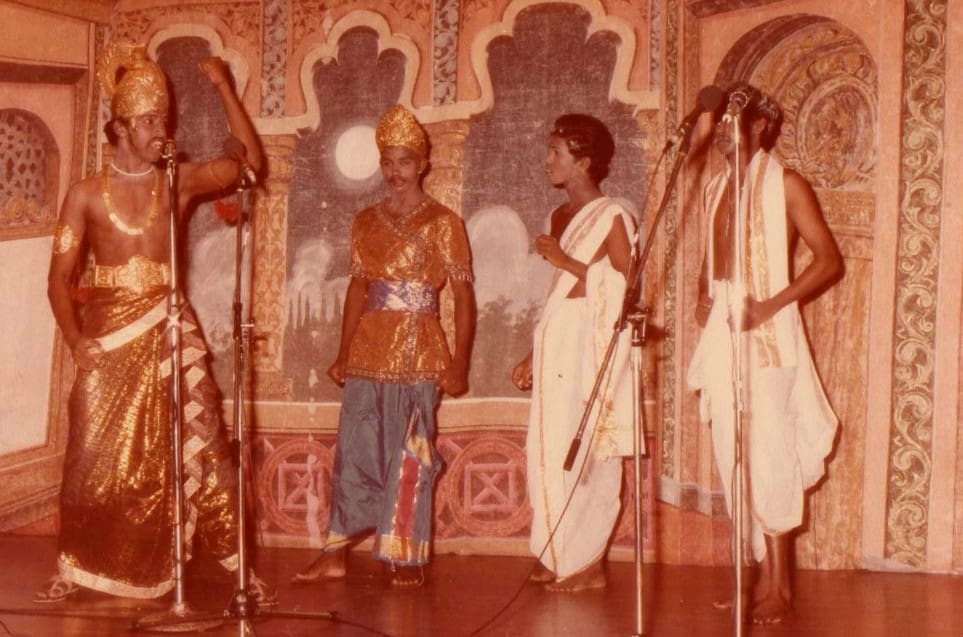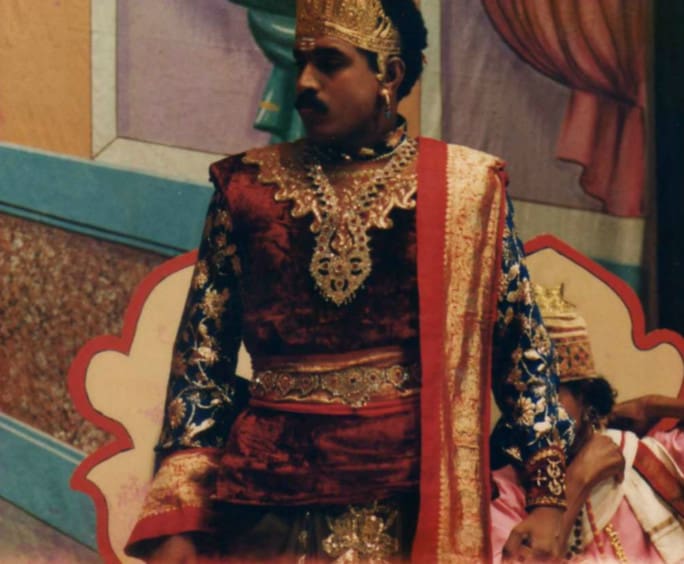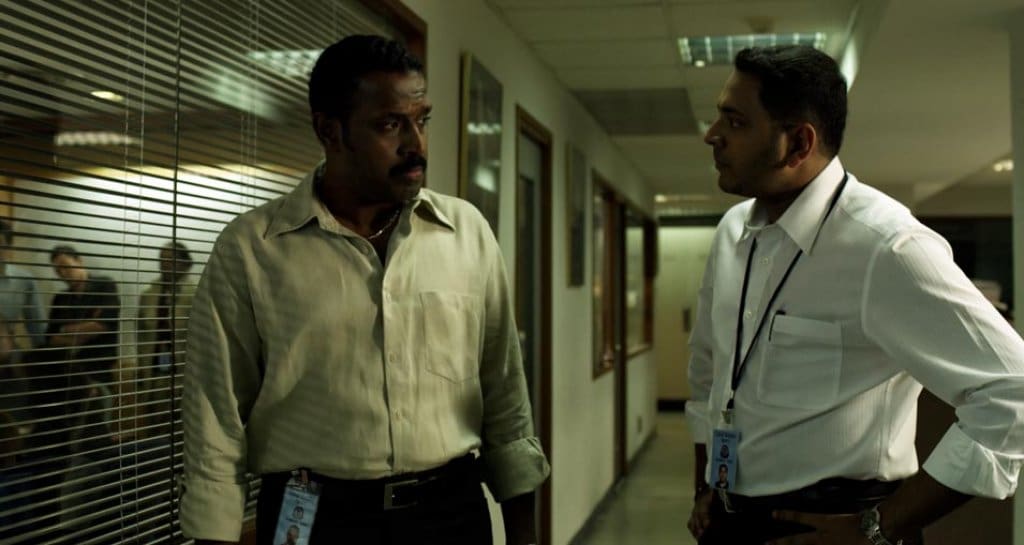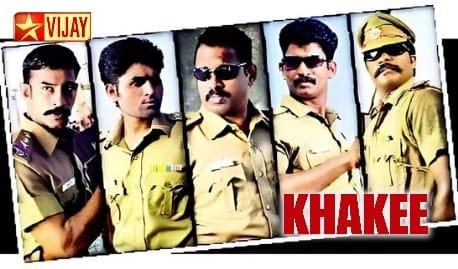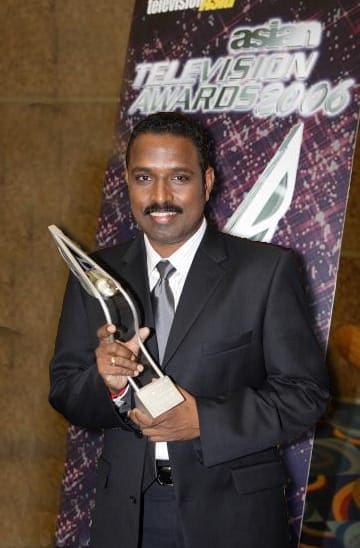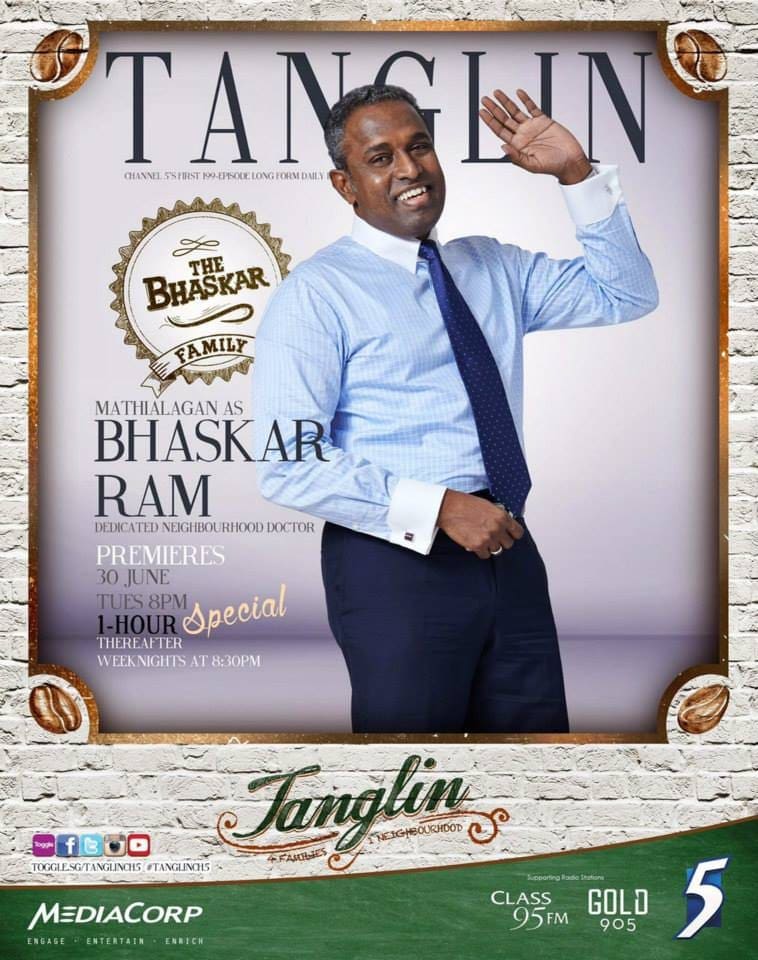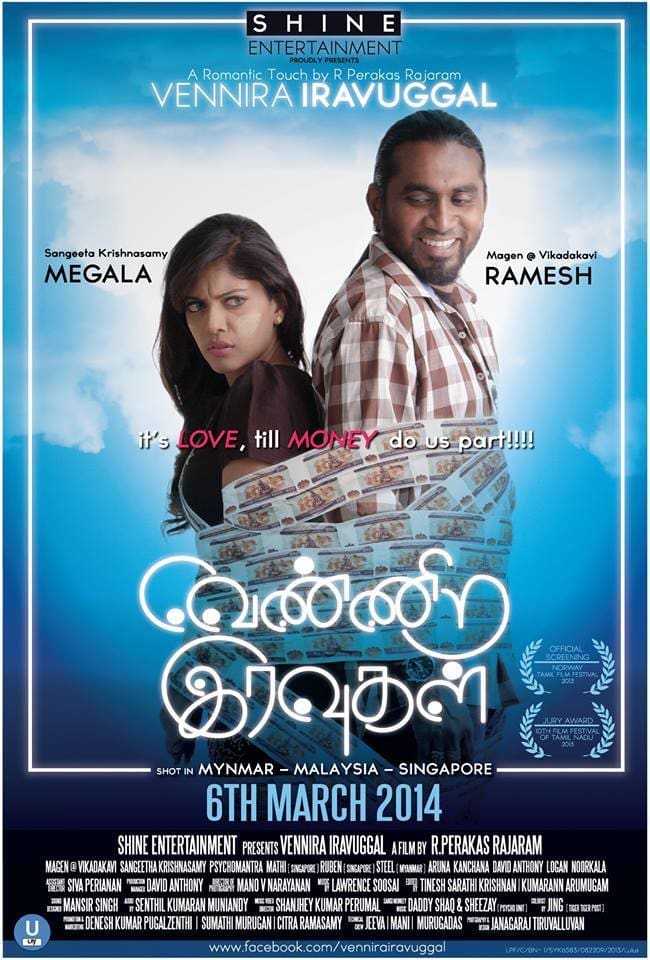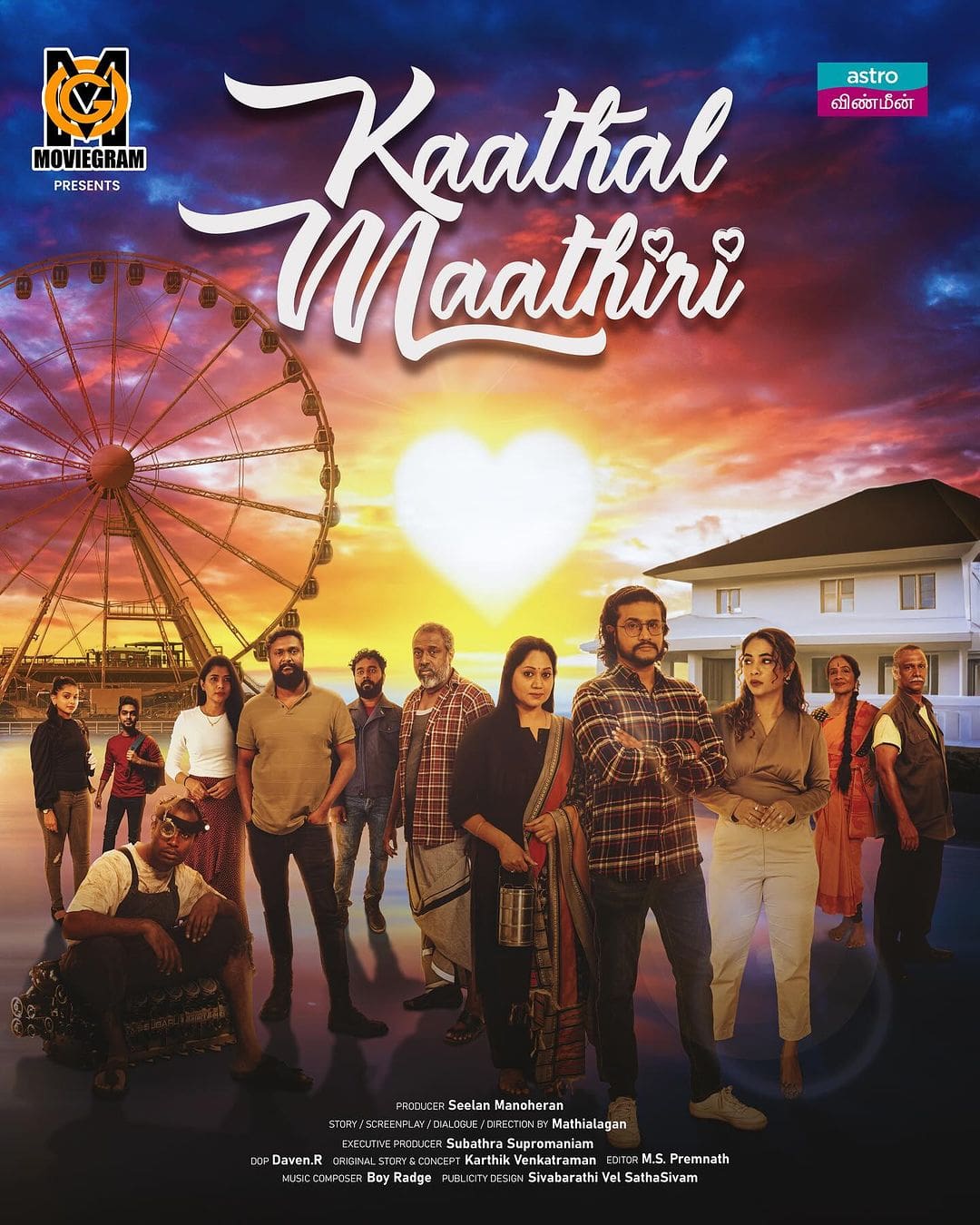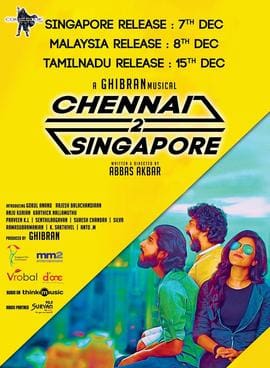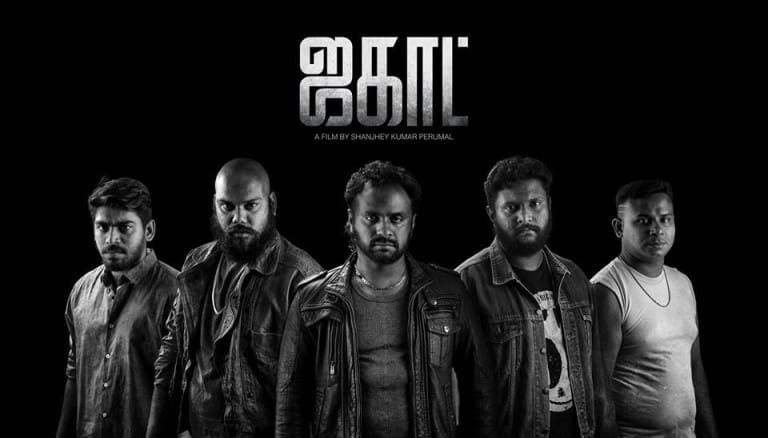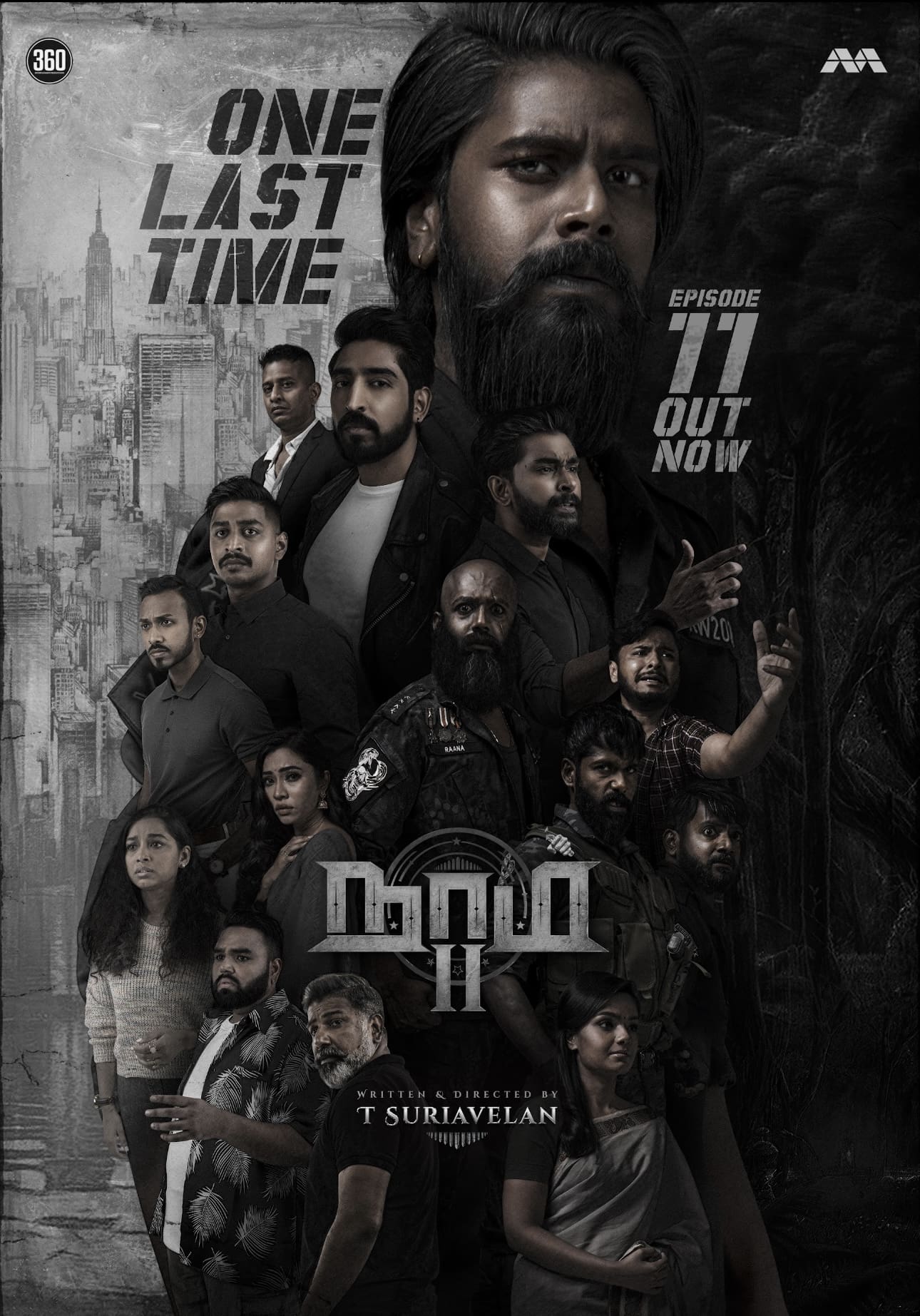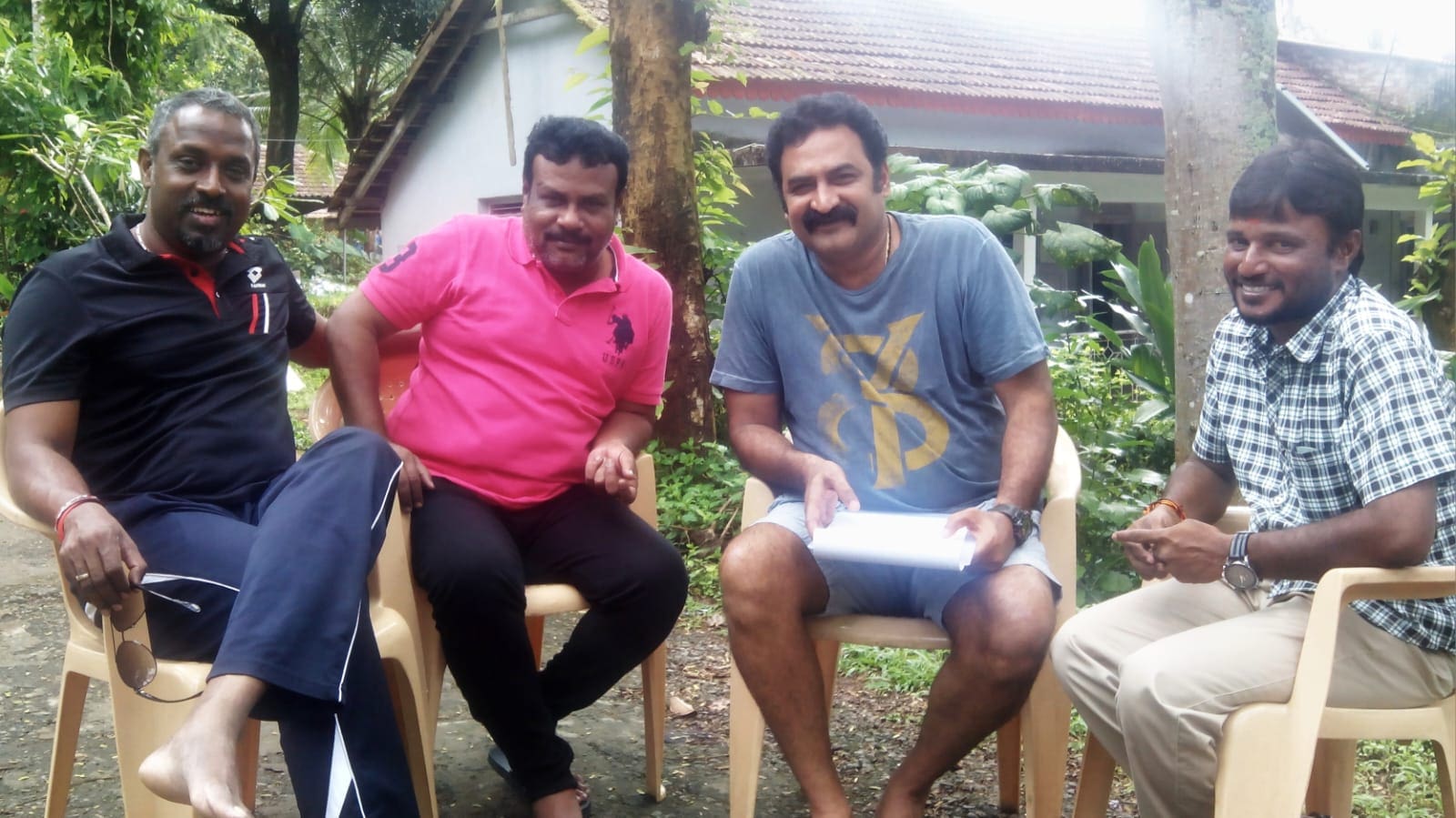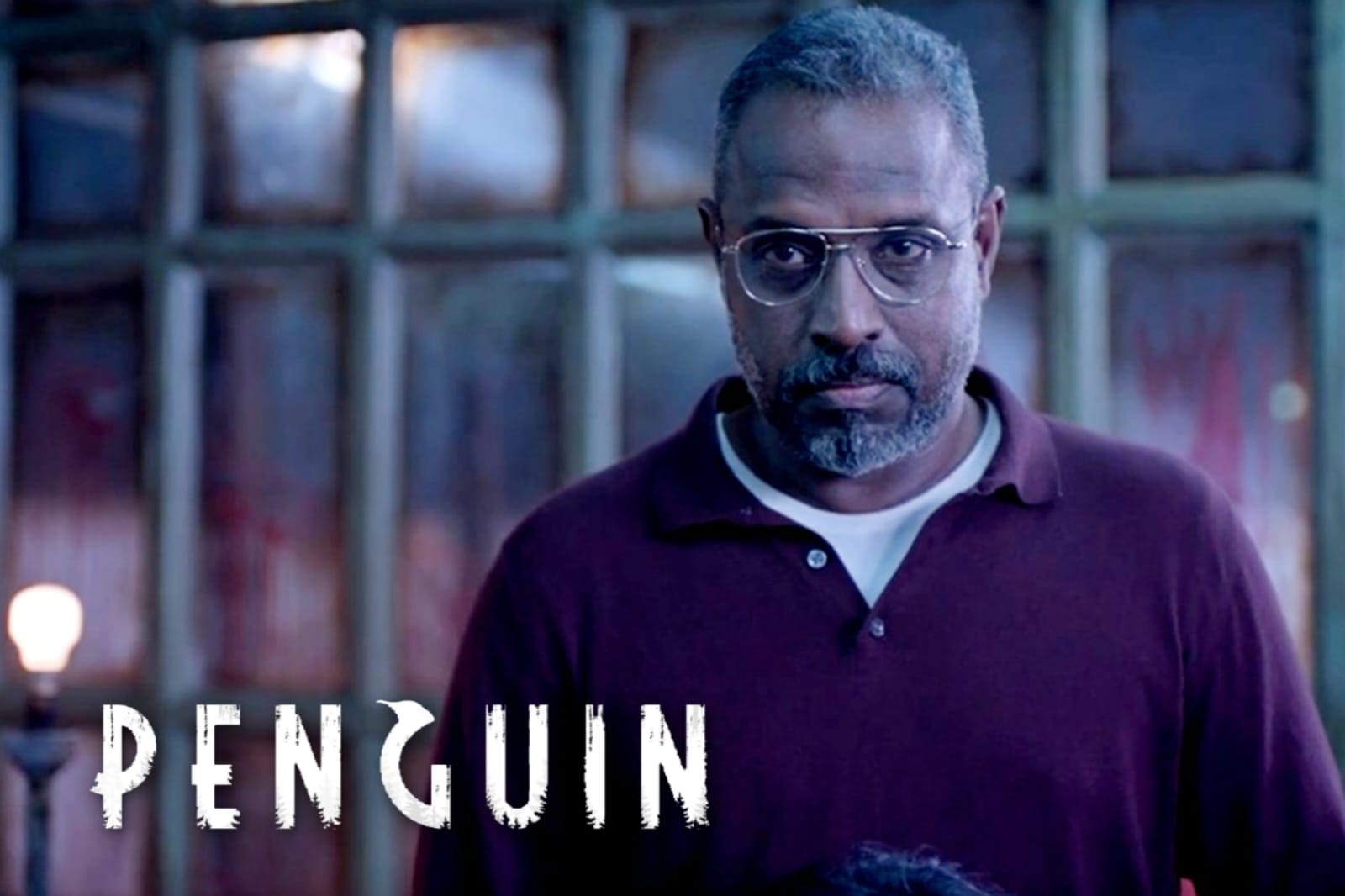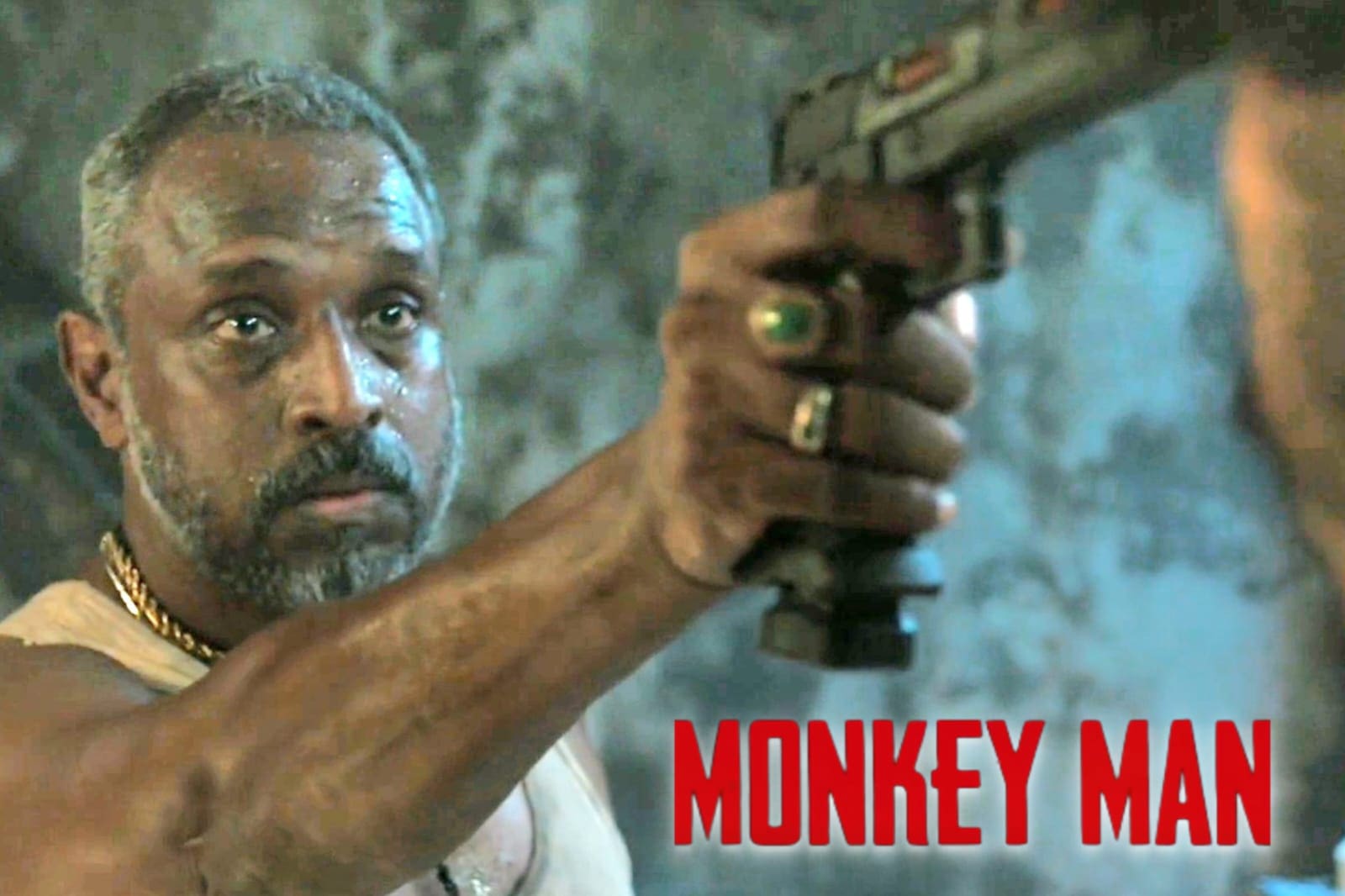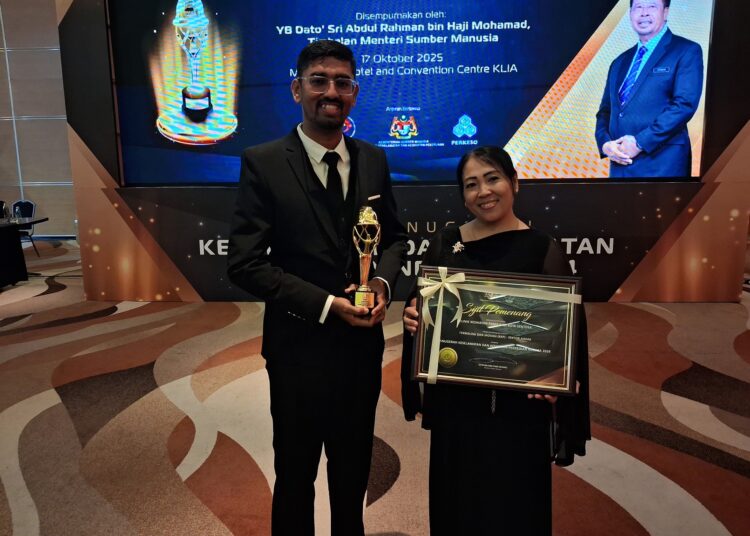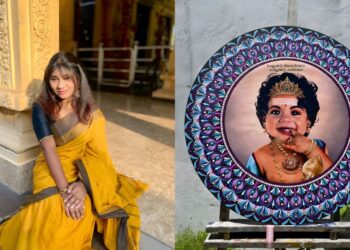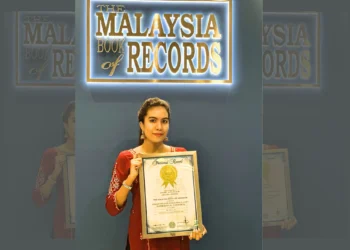“I am an Actor not just a Singaporean Actor.”
Mathi Alagan, the now-60-year-old actor, has nearly half a century of experience working in the artistic industries across Singapore, Malaysia, India, and the West. From his beginnings in Tamil stage plays as a young boy in the 1970s to gaining prominence in Singapore’s English and Tamil serials in the 1980s to getting roles in Kollywood and Hollywood, Mathi Alagan is one of the most eclectic and enigmatic international Tamil actors that has lived for the world of performance. In this exclusive interview, Mathi shares his unrelenting journey towards sharpening his skill in acting, from his first stage play as a timid young Tamil boy in Singapore to his stint as a seasoned and confident acting professional in Dev Patel’s Hollywood film Monkey Man.
From Thanjavur Boy to Singaporean Tamil Stage Performer
“To be part of Art, was to be part of Tamil.”
Born in Pattukottai, Thanjavur, Mathi Alagan would migrate to Singapore with his family at the age of two and a half years old. Growing up in a simple and loving working-class family, Mathi would gleefully help his dad deliver newspapers at a young age. But at school, the young boy would receive constant bullying from his classmates because he was an ‘oorukaran’. Because of this, Mathi had grown up timid, insecure, and with a severe lack of self-confidence. So afraid was the young Mathi that even when he knew the answers to questions in class, he had never raised his hand in fear of expressing himself. Although fearful in public, Mathi had excelled in academics and had exemplary proficiency in both Tamil and English.
Despite the inferiority complex that he had been possessed by due to all the bullying, within his heart lay a deep and profound ambition to succeed and win. All around him, Mathi had seen that those who won in sports competitions would gain big trophies, but since he was not athletic, he had to find another route to win accolades. His academic achievements only amounted to being prized dictionaries when what he truly wanted was a big shiny trophy that reflected his success in a victorious display, and more than just the trophy, he had wanted to make his mother beam with pride at his achievements. With a heart overflowing with ambition, Mathi had entered himself in every competition he could find, from public speaking to singing to dance, but because of his nervousness, he could not succeed in these fields. But these failures did not wither his strong determination.
At the age of 11, he had gotten the opportunity to play an important supporting role in a Tamil stage drama. At the same time, Mathi was also chosen to be the understudy for the lead actor. On the day of the performance, the lead had gotten terribly ill, which subsequently caused Mathi to replace him. At first, the young Mathi was not too nervous, as he had already studied and practiced his lines, but as soon as he got on stage, his fear and nervousness consumed him, forcing the boy to start shivering and crying on stage. Ironically, instead of this moment ruining the play, the audience had given him a standing ovation, because in that particular scene, the character that Mathi was portraying was meant to break down and call out to God. Mathi’s own private anguish on stage was interpreted by the audience as a divine and impeccable performance by a young actor who was expressing the vulnerability of man before the omnipotence of God.
Upon being drowned in praise, Mathi felt as if he was on top of the world. Beyond the love of the audience, he had also managed to make his mother extremely proud, which made him even more ecstatic. Over the next decade, Mathi would go on to act in nearly 120 plays across Singapore, mainly in historical and mythological Tamil dramas. For Mathi, more than the medium of the stage play, it was the Tamil language that drew him towards the world of art. He explained that in Singapore, outside of the stage, the world around him operated mostly in English. Whereas the world of the stage play allowed him the luxury to express and unravel himself in his mother tongue, Tamil. It was this love for his language that rooted him in the realm of the arts. At the age of 24, he began to join the formal workforce and could not make enough time to perform in plays. Explaining that one play took nearly 6 months to prep and that he simply did not have enough time to be a part of it anymore. All this would change when Mathi was pulled into the exciting new world of television drama.
Transitioning from Theater to Singaporean Television
“We must work with reality.”
Mathi started his acting career on television in 1988 on the Singapore Broadcasting Corporation’s (SBC) Tamil channel. Coming from a theatre background where acting and performance were live and more intimate, Mathi initially found the medium of television serials to be too plastic, inauthentic, and one-dimensional. But it was through his senior theatre artist, the late Ammaiyar Susila, that he was advised to give television acting a chance. Mathi then wrote a letter to SBC, conveying his interest in acting for the channel. He had then been called up by one of the producers of the channel, C. Ramakrishnan, who had asked him to come to meet him one day. Unbeknownst to Mathi, who had thought he was stepping into an audition, upon arrival, the young man of 24 was given his first ever television role on the spot. Many of the Tamil producers and directors of Singaporean serials were already aware of Mathi’s stage performances and completely trusted Mathi for being able to adapt to world television acting. Mathi articulated that acting for the medium of theatre and television was very different. Theatre demanded the actor to perform with every inch of their body for the live audience before them, while television, with its spectators being fed through the eyes of the camera lens, only had to act through their faces that were intimate with the camera, so there was no requirement for loud and dramatic expressions because that would overpower and nauseate the screen. Television had demanded a lot of restraint from him, a traditional theatre artist.
When asked about his over forty years of experience in Singaporean television acting, Mathi recounts three roles that have been pivotal and crucial to his growth as an actor and human being. He had first cited his first ever villain role in the series Ithu Kathai Alla, where he plays the role of a good man who slowly becomes corrupted into becoming a womaniser. Mathi details that the transformative nature of the role had given him the courage to venture out of traditional protagonist characters and expand his acting skills to express diverse potrayals. The second influential role was in the 2003 serial Soor, which saw Mathi take on the role of a drug addict who tries to recover his addiction for the sake of his son. Mathi notes that this character had influenced him to practice method acting—dressing and behaving like an addict—to get himself to completely understand the depth of the role. It was in this particular role that Mathi learned that the weight of a character is unbounded by script and dialogue; he shares that actors should understand their roles profoundly, where even when their characters are absent from the scene, audiences are given enough captivation to speculate about their existence. He stresses that acting does not end with a scene. Apart from that role, the 2009 series Mudichi, in which Mathi played the role of an executioner, carved a lasting impression within the actor about the profound existentialism of life and the construction of human morality. It made Mathi think beyond the role of the character and began questioning himself about the paradox of being an executioner who is bound by the law to kill prisoners but at the same time questioning the legality of the execution when that too is a form of murder.
Beyond the world of Singaporean Tamil television, Mathi had also amassed success in Tamil Nadu Vijay TV, being casted in the main roles of the 2008 serial Khakee and 2013 serial Thayumanavan.
Mathi was already an established and celebrated actor in the Singaporean Tamil media when he was being offered roles to act in the Singaporean English media. The actor had been awarded the internationally prestigious Asian Television Awards in 2006 for Best Actor and had been a four-time winner of the exceptional Vasantham’s Pradhana Vizha in 1999, 2003, 2004, and 2021, all in the category of Best Actor. Due to his understanding of the incredible status that he has established for himself through his great efforts, Mathi did not want to take on the small, stereotypical, and one-dimensional roles that had been first offered to him by the Singaporean English productions. He would not do roles that would disrespect his caliber as an actor or ones that would give bad representation of the Singaporean Tamil community, such as underwritten roles as a mamak shop owner or a gangster.
Between working in Tamil and English, Mathi’s acting expresses itself differently. He states that the structure of acting is linear in all languages; it is just that the articulation of it translates differently on screen because of the cultural context of the language. Mathi ingrains that when an actor assumes proficiency in a language, they can master the articulations and vernaculars that come with acting through that specific language. He gives the example of how in Tamil, acting is more pronounced as emotions are expressed through dramatics, but in the English language, acting is articulated more subtlety and discreetly.
Within the media landscape of Singapore, there are two English-language channels that feature locally produced content and one Tamil-language channel that only features less than 50% of locally produced shows. English productions have higher production budgets than Tamil productions, but even with these limitations, Mathi explained that Tamil productions are able to produce quality content that even surpasses that of English productions. In light of this fact, Mathi states that Tamil creatives, instead of complaining about the existing limitations, must learn to work with the reality of their circumstances as minorities, to produce excellent content. He states that budget alone cannot determine the quality and integrity of a creative work on television, adding that Singaporean creatives must have bigger visions beyond the borders of Singapore. For Mathi, he does not merely view himself as a Singaporean actor but as an international actor; he shares that it was through this internationalist perspective that he was able to build himself up to become the actor he is today. Furthermore, Mathi iterates that while he has received different payments for different roles in different nations, he has contributed equal amount of effort to each role without viewing payment as a metric or quota for his talent. He wants younger and established actors to also emulate this integrity when taking on roles and to give their soul to each performance regardless of the circumstances of payment because the art of acting should not be regulated by mere monetary metrics.
On the Malaysian Industry and Becoming a Director
“We have to tell our own stories.”
Mathi’s first leap into Malaysian Tamil cinema was through the Johor Bahru-produced films Ayyappa (2010) and Agileshvari (2014). He would subsequently go on to star in the Malaysian hit film Vennira Iravugal (2014), along with Villavan (2018) and Bhiishman (2019). To Mathi, there are certain differences between the Malaysian Tamil and Singaporean Tamil industries, such as how there are many more localities in Malaysia to film in as opposed to the limited space of the city-nation of Singapore, where a single location is often reused multiple times. Moreover, Mathi highlighted how Malaysian Tamil fans had always treated him with outmost warmth and generosity that felt akin to being greeted by a loving family member. Apart from the loving nature of Malaysian Tamil fans, Mathi also expressed that, in his perspective, Malaysian Tamils are always eager to support local talents, creating a nurturing environment for local artists to flourish and succeed.
Malaysia had also been the soil in which Mathi had debuted himself as director and screenplay writer with the Astro production Kadhal Mathiri in 2024. Being involved with the media industry for several decades now, Mathi had always admired and wanted to step into the role of director but had not gotten the chance till this project came about. Mathi stated that a large part of his desire to become a director was to create works that earnestly and critically reflected the social and cultural realities of Tamils in Malaysia and Singapore. He added that the reason Tamil audiences and film practitioners from India do not have high regard for Malaysian and Singaporean films is because they view films produced here as subpar imitations of their own Kollywood productions. Mathi stated that in order to uproot this cycle of lazy and uncreative plagiarism, filmmakers from Malaysia and Singapore must invent new film narratives and aesthetics for themselves without replicating from Kollywood. This ambition was a major reason for him creating Kathal Mathiri and writing the script as authentic and realistic as possible, with real people and real emotions. This vision was also shared by the Malaysian producer of the series, Seelan Manogaran. Mathi shared that after viewing Kadhal Mathiri, many people had praised the series for the natural and genuine performances of the actors and the well-written depth of the screenplay. Mathi attributes a lot of the success behind the script to having intensely studied the craft of direction through reading books, and through applying the many years of his experience as an actor to perfect and bring alive each characterization. He also noted that another crucial reason for him wanting to take up the role of director was so that he could leave a lasting legacy and impression upon younger actors that could be guided and sharpened under his leadership.
Even with his love for direction, Mathi had still stumbled upon the usual hardships that come to a director working in the Malaysian Tamil industry, like production restraints and battling with his own procrastinations and writers block. He had also encountered dissatisfaction and trouble with having to translate the script into Tanglish, where Tamil is written in the Latin script. Mathi stated that he had always either written in Tamil or English but never in Tanglish, where the spelling of each word has yet to be standardized. In Singapore, scripts are usually written in the Tamil script because most Singaporean Tamils can read Tamil because studying Tamil is made compulsory by the government. However, because it is not enforced by the Malaysian government to study Tamil, most Malaysian Tamils do not know how to read the Tamil script. Mathi shares that in the long run, this promotion and normalisation of Tanglish is dangerous because it has the potential to kill the Tamil script. He states that it is essential for an actor who is working in the Tamil industry to actually know the language in depth if he is aspiring to perform well in the medium.
When speaking about the art of acting, Mathi articulates that it is not enough for actors to call themselves actors because they have simply acted in one film or even several films. For Mathi, acting is a profession like any other that deserves to be studied theoretically and practiced profusely. One has to understand the fundamentals of acting as an artistic medium before rushing towards wanting to be on screen. He states that education, practice, and creative intellect are what make a person a great actor, not the number of times they have appeared in films or how famous they might be. To emphasis this, Mathi shared a thought-provoking allegorical story of two men who were cutting a tree. “One man had continuously been cutting down the tree, while another took a break in between. In the end, it was the man who had taken many breaks who succeeded in cutting his tree down first. When the first man, in frustration, asked how the second could accomplish the task before him, who had been diligently cutting the tree without rest. The second man simply stated that each time he went on break, he was sharpening his axe, so each blow to the tree trunk was more vicious and powerful than the last.” Mathi saw this story as something every artist should exemplify. He stressed that artist should not waste their time idly when waiting for a chance; instead, during moments where they have no work, artists must relentlessly strive to perfect their craft so that when they do get the chance, they can strike the world with their exceptional power. Mathi asserts that actors must remain students throughout their lives in order to be masters of the art.
Mathi explained that another reason for Singaporean actors to seek opportunity elsewhere is also because the Singaporean film industry is not able to sustain itself only by catering to the Singaporean audience. He cites how the film Chennai 2 Singapore was directed by a Singaporean Tamil director, Abbas Akbar, who, if he had returned to Singapore, could not have made a film at that scale. Mathi states that, like Abbas, Singaporean Tamil directors should be looking towards more international projects to direct instead of limiting themselves to the Singaporean industry. Furthermore, Mathi details the difficulties in establishing a Singaporean Tamil film industry, how for there to be a Singaporean film, there needs to be a production budget of at least 500, 000 Singapore dollars, and even with a budget, there would be many restraints by the bureaucratic sector in releasing the film. He shares how even once the film has been released, the Singaporean Tamil audience alone is too small numerically to produce any substantial profit for the film. That is why, Mathi stresses that in order for there to be a Singaporean Tamil film industry, Singaporean Tamils must establish a cross-national global network of audience members.
When asked about the impact that Malaysian Tamil films have on Singapore, Mathi expressed that Malaysian Tamil films have very little effect on the perception and trajectory of Singaporean audiences and media. He notes that apart from Sun-J Perumal’s critically acclaimed Jagat (2015) and the commercially successful Poochandi (2022) by J.K. Wicky, there has not been many Singaporean Tamils that have been interested in Malaysian Tamil films.
Mathi also noted that due to the apathy that some Malaysians and Singaporeans have towards supporting each other’s films, it is difficult for Singaporean cinema to survive alone, citing that one of the first ever Singaporean Tamil films, Gurushetram: 24 Hours of Anger, which he stared in, had a good reception in Singapore but had done poorly in the Malaysian market due to the lack of interest of the Malaysian public in supporting Singaporean Tamil films.
While so, it must be noted that there have been many transnational cultural exchanges between Malaysian Tamil and Singaporean Tamil media throughout the years. For instance, Malaysia’s Shalini Balasundaram Geethayin Raadhai (2016), which starred Karnan in the lead role, had been a sounding success with the Singaporean Tamil audiences, who had grown to give a space for Malaysian Tamil artist Karnan, who would go on to act in prominent Singaporean Tamil creations like T. Suriavelan’s Avathaaram (2019), which cast Karnan in a pivotal role. The Singaporean series had also been telecasted by Astro, allowing Malaysian audiences to be exposed to Singaporean Tamil media, giving way for a rich transnational exchange between the Tamils living in these nations. Suriavelan in particular has also been an important cultural figure who has amassed himself not only a dedicated fan base between Malaysia and Singapore but also world-wide with his series Naam, which he had directed and starred in.
On Working in Kollywood
Beyond the Singaporean and Malaysian media industries, Mathi had also worked in popular Kollywood films. He had gotten the opportunity to act in Kollywood films because of his deep affiliations with Kollywood industry professionals who he had met while working in Vasantham. They too had been aware of Mathi’s acting abilities, and in fact, it was through his association with the Tamil Nadu filmmaker Karupalaniappan that he got his first gig in Kollywood in the 2001 film Poovellam Un Vaasam, which starred Ajith as its main lead. Mathi would go on to act in several Kollywood films, like Kanchana 2 (2014), JIppa Jimikki (2015), Paranthu Sellavaa (2015), and Lo-Law & Order (2023). Mathi had also acted as a villain in the Keerthy Suresh film Penguin (2020), which garnered him Tamil Nadu’s 14th Edison Award for Best Character Actor in 2022. Apart from that award, Mathi had also been a nominee for the Vijay Star Awards for Best Foreign Talent and Best Supporting Actor in 2014.
Mathi explained that having worked in Kollywood from Poovellam Un Vaasam to Penguin, the industry has faced many extraordinary transformations. Kollywood, which had been an industry that was just catering to Tamil Nadu, Sri Lanka, Malaysia, and Singapore, had grown to exponential international heights over the decades, covering nearly every nation that hosts a large, significant Tamil-speaking population. This international growth had also fed into the production value and scales in which films are taken in with larger-than-life sets and plotlines. Mathi states that Kollywood is an incredibly difficult and harsh industry to get into; there are hundreds and thousands of people lining up every day in Kodambakkam to get a chance to act, and only the most lucky and competitive individual with an immense amount of resilience gets to see their dreams come true.
On Working with Dev Patel in Monkey Man
Mathi’s journey as an actor had brought him across nations and borders and finally to Hollywood itself, with his role in Dev Patel’s Monkey Man. Mathi had been given a chance in this film because the producers of Monkey Man had seen his phenomenal work in Penguin. The film itself had been a dream project of Dev that he had written, directed, and produced himself in defiance against the rigid racist productions of Hollywood. Mathi expressed that working with Dev had been an immense pleasure and learning experience for him; in fact, Dev, in a way, had been the final push for Mathi to take on the role of direction. The actor explained how watching Dev not only direct but also produce and perform the stunts of the film with complete dedication and uncompromising vision had been incredibly inspiring to Mathi as a professional in the industry. Throughout the filming of the movie, he had grown to garner deep respect for the young director. To Mathi, Dev had been an example of a creative who surpassed all the challenges before him without giving up.
“Acting has been my entire life.”
At the age of 60, Mathi boldly professes that for as long as he lives, he will immerse himself in the world of acting, directing, writing, and all that is rooted in the world of performance and cinema. He expresses that he would also continue his current task of teaching students about acting and hold public speaking workshops. For the future of performers and the art of acting, Mathi hopes that the younger generation of Tamil actors will learn to respect and honour the profession of acting by properly and dedicatedly training in it. He envisions that young actors will not only devote themselves in the act of acting but also in the depth of the Tamil language, mastering the linguistic complexity of the language to become more articulate in their expressions of it. He stresses that language proficiency is incredibly vital for actors to grow and that an impeccable grasp of language will elevate not just the performance of the actor but also allow the actor to work internationally. It was also crucial that actors who come from making reels on social media actually learn the structure and foundation of acting on screen to perfect their craft instead of merely replicating their social media performances onto roles in television and cinema. The acclaimed and seasoned actor ended the interview with gratitude and reminiscence about how much his near 50 years of acting granted him and blessed him with everything in his life, from family to friends to a network of professional alliances. Acting had taught him his humanity and brought him closer to his consciousness. It had not just been a career but a lifeline to him, without which he would not have become the bold and steadfast man he is today. It was the world of performance that had taught Mathi how to think, feel, and express his sentience; it was acting that made him realise his being and body at its depth and totality. And it was this world that he chose with his entire heart and soul to spend the rest of his days in, consciously in surrender and in ambition to sharpen the weapon of this momentous instrument called acting, that reflects, refracts, and remembers the finality of existence.
This is a Varnam Exclusive Feature! Reproduction requires a credit to Varnam Malaysia.
Follow us on Instagram, Facebook or Telegram for more updates and breaking news.


